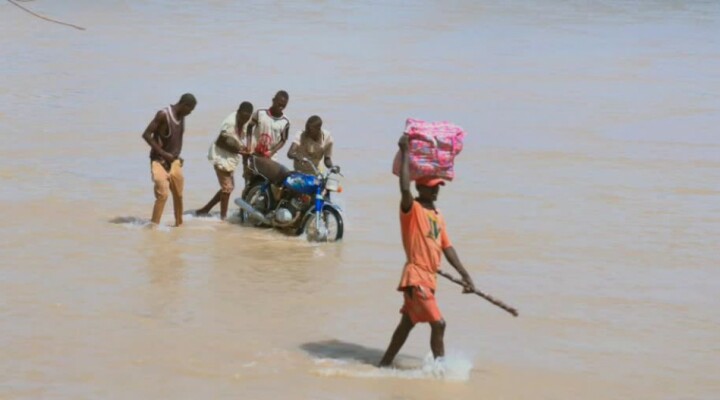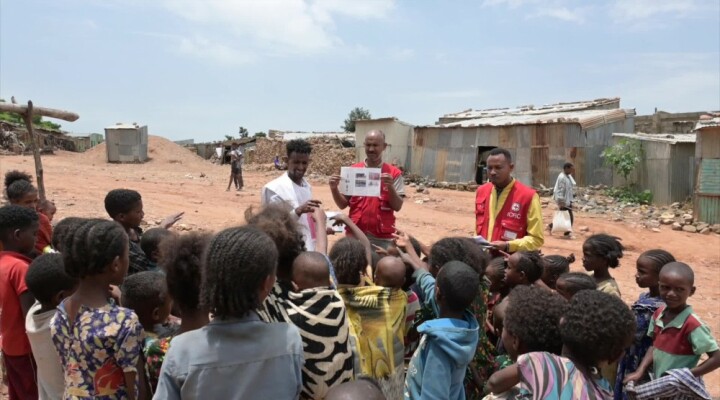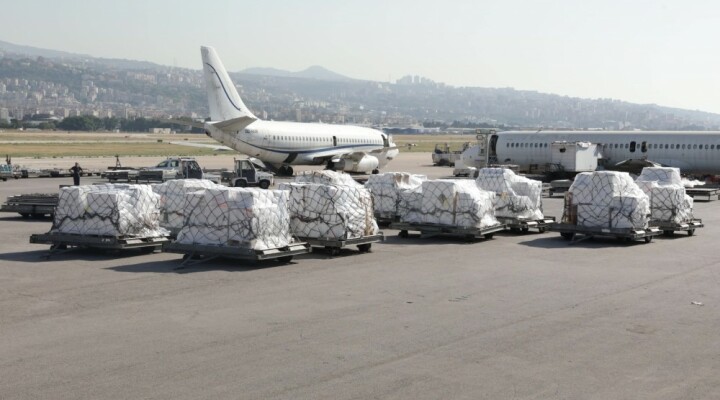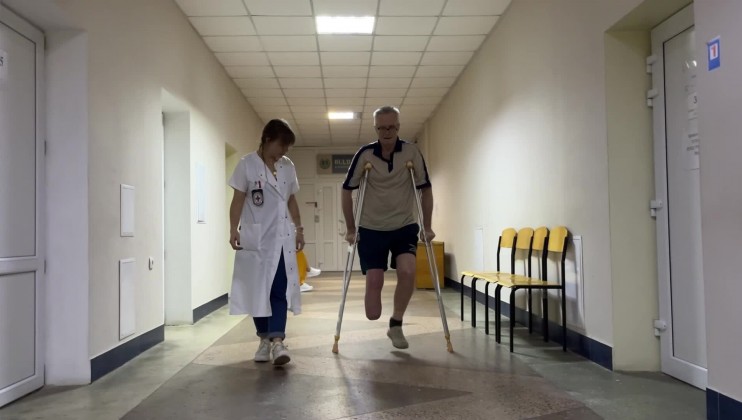Yemen: Women and girls struggle to access essential healthcare
Sana’a (ICRC) – Eight years into the armed conflict in Yemen, violence, economic hardship and deteriorating health services and health infrastructure increasingly keep women and girls from being able to access the essential healthcare they need. As funding shortages force humanitarian organizations to scale down aid, their predicament will only increase.
In Yemen today, less than 50% of births are attended by skilled health professionals, according to UNICEF. One mother and six newborns die reportedly every two hours in Yemen because of complications during pregnancy and for causes that are almost entirely preventable, mainly due to limited or no access to health services.
“It’s a miracle that I’m still alive after my last childbirth”, said Najla, who is from Taiz, Yemen’s longest-running battlefield, where violence has exhausted the population. “I had complications during labor, was at home and all nearby health facilities were shut down because of the violent clashes. Luckily a nurse lived nearby, she helped me deliver my baby and saved both our lives.”
Among the estimated 4.2 million people displaced in Yemen since the beginning of the conflict, 73% are women and children. Displaced women and girls suffer from additional economic and social vulnerability resulting in limited access to basic services, including to adequate healthcare to treat chronic disease.
“The pain is unbearable!” said Moghniya, a single mother suffering from terminal stage cancer who lives in the internally displaced camp of Swaida in Marib, in central Yemen. “I was assigned to a cancer center in Mukalla, hundreds of kilometers away. I couldn’t afford transportation between treatment sessions and bear the long travel required. Now, I’m just sitting in my tent, waiting for death to release me from my agony.”
More than 20.1 million people out of a total population of 30.5 million currently lack access to basic health care. Only 51% of health facilities still function across the country. Violence further complicates the ability of patients to reach lifesaving healthcare.
“Women who lost husbands over years of conflict became hesitant to travel to seek health support, especially if they live in rural areas, as they fear getting attacked or harassed on their way,” said Nabiha Ahmad, supervisor of the main public dialysis center in Aden, which is supported by the International Committee of the Red Cross. “During the past years, many of our female patients suffering from kidney failure, particularly those living in remote areas, died in their homes because they couldn’t reach the center in time for their live saving periodic treatment.’’
Saida, a 45-year-old teacher from Aden who suffers from kidney failure, echoes this sentiment. She needs a minimum of two weekly sessions of dialysis. “On many occasions during the peak of violence, I had the choice of either staying home and die from illness or risk getting caught in crossfire while trying to reach the nearest dialysis center,’’ she said. ‘’Even during calm periods, it remains complicated, particularly for us women.”
For more information, please contact:
Basheer Omar (Sanaa) balselwi@icrc.org+967 737889476 and/or +967 771 480 412
Imene Trabelsi (Beirut) itrabelsi@icrc.org +961 3 138 353
Jason Straziuso (Geneva) jstraziuso@icrc.org +41227302077
Notes for editors:
Women and Girls access to health care in Yemen:
- 4.71 million children and women are acutely malnourished, including 1.14 million pregnant or lactating women who require treatment for acute malnutrition.
- Six million women are without access to the medical and mental health support they desperately need with protection services all but eroded. (UNFPA)
- 5.0 million Women of reproductive age in need of support . (UNFPA)
- 6.1 million Women in need of Gender Based Violence services. (UNFPA)
- One mother and six newborns are dying every two hours because of complications during pregnancy or birth.
- Five million women and adolescent girls lack access to essential, lifesaving sexual and reproductive health care.
- More than a million pregnant and breastfeeding women are acutely malnourished.
- One in three displaced households are headed by females, increasing their vulnerability to violence.
- The current water network reaches less than 30% of the Yemeni population. Thus, millions of Yemenis, including women and children need to walk for miles to fetch water.
ICRC supporting health care in Yemen:
- In 2021, more than two million Yemenis, including women, benefited from ICRC activities in the field of health.
- The ICRC continues to provide medical material, equipment, and medicines to 48 hospitals, 3 dialysis centres and 36 primary healthcare clinics across the country.
- More than 1.1 million people received health care services in 46 health facilities, where YRCS supported with medicines, medical equipment and devices, incentives for staff health workers and staff members, and capacity building training for medical staff as well as fuel, water, and maintenance.
- Over 47,000 consultations were provided in 9 health facilities with support of incentives for health workers and staff.
The ICRC continues to support 6 health facilities of which two hospitals with medical materials to be able to treat war wounded people. - The ICRC in Yemen has been supporting 5 Physical Rehabilitation Centers (PRCs) in Sana’a, Taiz, Sa’ada, Aden and Hadhramaut governorates with equipment, incentives for the staff, technical support and raw materials, components and machinery for manufacturing prostheses and orthoses. About 90,000 services including 47,000 assistive devices are provided in a year by these 5 PRCs supported by the ICRC
- The ICRC supports the treatment of tens of thousands of war-wounded patients every year and provides services to more than 54,000 people with disabilities, including women.
- The ICRC supports diploma programs for prosthetics and orthotics in partnership with the Higher Institute for Health Sciences for 10 students (3 years) and provides scholarships to 25 students to do bachelor’s degrees in the field of orthotics and prosthetic at Sana’a University.
Log-list
Title : Yemen
Location : Aden/Marib/Taiz/Abyan/Hodeida
Length : 07.04m
Producer : Wagdi Almaqtari/ICRC
Production languages : Arabic/ English
Filming dates : June 2022
Copyright : ICRC access all
|
Time Code |
Scene /description/ transcript |
|
Soundbite 1: Najla, Mother Taiz |
|
|
00:00 00:04 00:11 00:16 00:25 00:34 |
The lack of health services is exhausting us. It’s a miracle that I’m still alive after my last childbirth. Luckily a nurse lived nearby, her name is Jamila, I carried myself to her house, and there was shelling outside, bullets were flying everywhere. I was so scared. She helped me deliver my baby in her house and saved both our lives. We’ve been through so much. Plenty have died and those who survived were the lucky ones. |
|
00:44 |
B roll Various scenes for the healthcare center-Taiz |
|
Soundbite 2: Amal, Midwife Taiz |
|
|
01:14 01:18 01:30 |
Pregnant women are facing more and more challenges to deliver safely. More women in labor are reaching the health facility too late.And that’s caused by the roads blocks and unavailability of means of transportations because of violent clashes Even when a delivering woman reaches us on time, we still face challenges to guarantee the necessary equipment, drugs, oxygen, electricity and fuel |
|
Soundbite 3 : Mariam, Mother, Abyan |
|
|
01:42 01:47 01:49 01:56 |
The violence is forcing us to live in permanent state of fear. You never know when you will be attacked. Accessing hospitals during emergencies is very complicated for women and children. We are watching helplessly our children die right in front of us because of our inability to reach health support, We are struggling to afford the cost of transportation to hospitals.We are forced to ask relatives and neighbours for money just to cover cost of transportation to hospitals. |
|
02:05 |
B roll : arious scenes for the healthcare center-Abyan |
|
Soundbite 4 : Nabiha Ahmad, supervisor of the main public dialysis center in Aden, supported by the ICRC |
|
|
03:14 03:18 03:35 |
Sick women are particularly affected by the war Those who lost their men over the years of conflicts, and who needs dialysis became hesitant to travel alone Many from our women patients suffering from kidney failure, especially those living in remote areas, died in their homes as they couldn’t reach the center for their periodic treatment. |
|
Soundbite 5: Saida, dialysis patient, Aden |
|
|
03:44 03:54 04:05 04:13 |
It’s easier for men, they can move freely, jump on a crowded bus, it is complicated for women to do the same here During the peak of violence, there was no means of transportation, and it was frightening to leave the house. I was scared too. But I had the choice of either staying home and die from illness or risk getting caught in a shooting while trying to reach the nearest dialysis center. I decided to take the risk |
|
04:18 |
B roll Various scenes in dialysis center - Aden |
|
Soundbite 6: Fatima, Swaida camp, Marib |
|
|
05:03 05:10 05:12 05:20 |
My Name is Fatima, and this my mom Maghniya. She is very sick, she has cancer. I’m the one taking care of her. I feed her, dress her her, help her wash, take her to the toilet, do her bed. I used to go to school and reached the 4th grade, then I had to stop 3 or 4 years ago when my mom got sick. |
|
Soundbite 7 : Moghniya, Swaida camp, Marib |
|
|
05:33 05:42 05:58 06:10 06:14 06:19 |
The pain is unbearable! The tumor expanded massively, it’s too late to do anything about it. pills I’ve been takingfor last three years are just inefficient and exhausting me even more. The nearest health clinic is too far, even if I manage to go there, nothing they can give me except life fluid. I was assigned to a cancer center in Mukalla, hundreds of kilometers away. I couldn’t afford transportation between treatment sessions and bear the long travel required. Various scenes for Fatima around her tent and while taking care of her mom. |



